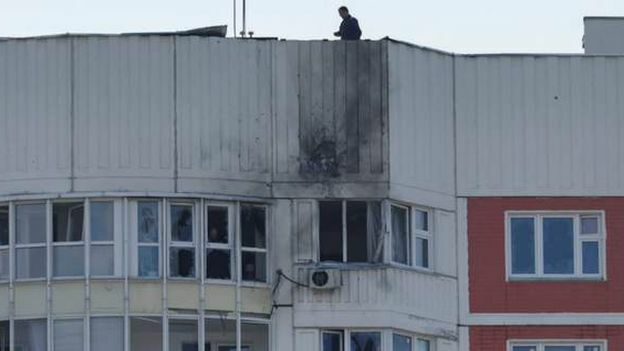Putin accuses Ukraine of drone attacks targeting Moscow civilians

Vladimir Putin, the Russian President, has accused Ukraine of attempting to intimidate Russian citizens following Tuesday’s drone attacks on Moscow, the capital city. He claimed that civilians were targeted, but the air defences managed to handle the threat effectively. The defence ministry reported that at least eight drones caused minor damage, but Kyiv denies any involvement. This marks the first time multiple drones have targeted the city since Russia invaded Ukraine.
Moscow’s Mayor, Sergei Sobyanin, stated that no one was seriously injured. Several drones landed in a western suburb where high-ranking officials reside. Putin, speaking on Russian television, said the attack was a response to what he called a Russian assault on Ukraine’s military intelligence headquarters in recent days. However, the BBC cannot independently confirm if such an attack took place.
“In response to this, the Kyiv regime chose a different path – the path of attempts to intimidate Russia, to intimidate Russia’s citizens, and of air strikes against residential buildings,” Putin said. “This is obviously a sign of terrorist activity.”
“They are provoking us into responding in kind,” he added.
Russia’s foreign ministry claimed that Western support for Kyiv was “pushing the Ukrainian leadership towards ever more reckless criminal deeds including acts of terrorism”. However, the US state department reiterated Washington’s stance that it does not support attacks within Russia, adding that it was still gathering information on the drone strikes.
The Moscow strikes followed an overnight drone attack on the Ukrainian capital, Kyiv, in which at least one person was reported killed. Ukrainian officials stated that falling debris set buildings ablaze as Ukraine’s air defences intercepted over 20 drones.
Meanwhile, Russia’s defence ministry reported that all eight drones targeting Moscow were intercepted. “Three of them were suppressed by electronic warfare, lost control and deviated from their intended targets. Another five drones were shot down by the Pantsir-S surface-to-air missile system in the Moscow region,” the ministry said.
The aerial assaults struck some of Moscow’s most prominent neighbourhoods, including Leninsky Prospekt, a grand boulevard created under Josef Stalin. A western Moscow suburb, where Putin and other members of the Russian elite have residences, was also hit.
Ukrainian presidential adviser Mykhailo Podolyak denied Kyiv’s direct involvement but stated that Ukraine enjoyed watching the events unfold and predicted a rise in such incidents. Putin acknowledged that while Moscow’s air defences had responded effectively, they still required “a bit of work” and needed to be “more dense”.
Viktor Sobolev, a former military officer, said the attacks came as a complete surprise to Muscovites. He explained that Russia’s radar could not detect the drones and trigger the air raid alarm because they were flying very low. He added that Russia should develop systems capable of detecting drones at low altitudes.
Three of the drones were shot down over Moscow’s exclusive Rublyovka suburb, according to a member of Russia’s parliament. The area, home to many of Russia’s business, political, and cultural luminaries, is a collection of exclusive gated communities situated in the forests west of the capital. One zone is a 10-minute drive from Novo-Ogaryovo, the suburban residence of the Russian president, believed to be Putin’s main abode. Other alleged residents include former president Dmitry Medvedev and Prime Minister Mikhail Mishustin.
Yevgeny Prigozhin, head of the Wagner Group, frequently criticised the neighbourhood’s inhabitants as an out-of-touch elite lacking commitment to Russia’s involvement in Ukraine. The mercenary chief blamed Tuesday’s drone attacks on military officials living in the suburb. In a defiant message on the Telegram app, he asked why Russia was allowing drones to fly to Moscow and concluded, “Let your houses burn.”
Dr Jack Watling, an expert on land warfare from the Royal United Services Institute, informed the BBC that Ukraine had struck airfields in Russia before, but not the capital. An alleged drone attack on the Kremlin occurred in early May. At the time, unverified footage circulated online showed smoke rising above the complex, while a second video showed a small explosion above the Senate Palace, used as offices for the presidential administration. Russian authorities claimed it was an attack ordered by Kyiv, while Ukraine’s President Volodymyr Zelensky denied his country’s involvement in the incident.
Latest Thailand News
Follow The Thaiger on Google News:


























